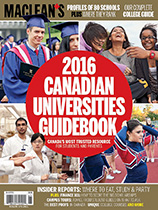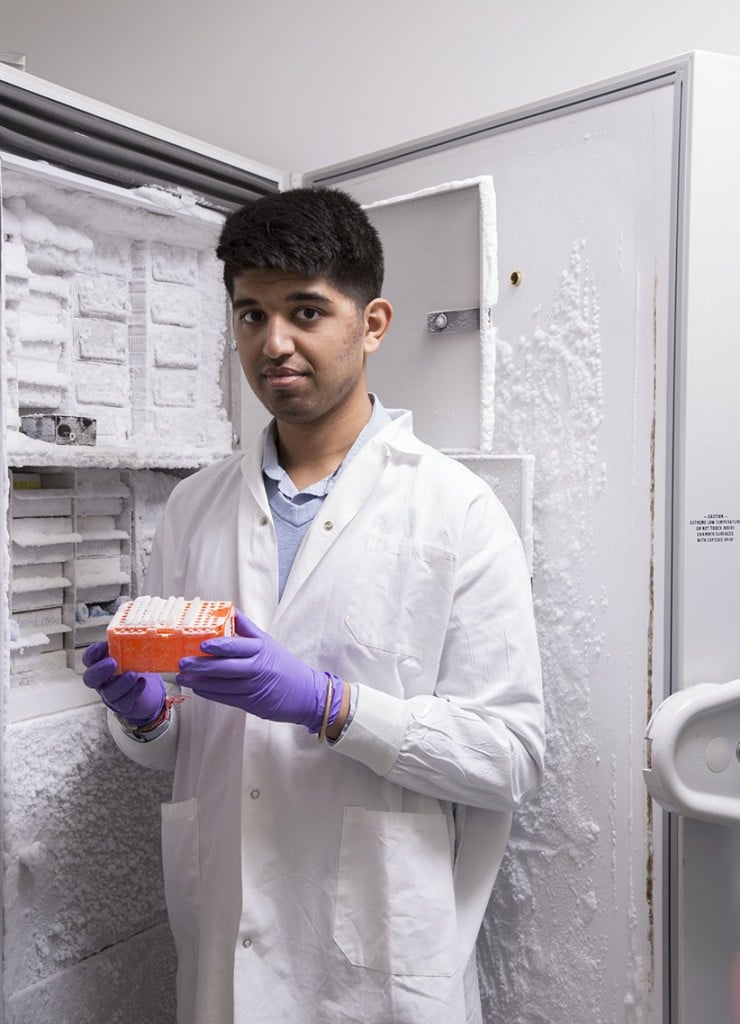How to go to university without paying a cent
To win a full-ride scholarship, you really have to shine. Here are four applicants who caught the judges’ eyes.
Second Year Biology student at York University, Sherry Wong. (Photograph by Kayla Chobotiuk)
Share

 This story is featured in our 2016 Canadian Universities Guidebook, available on newsstands now. Pick up a copy of the guidebook for full profiles of 80 universities, insider reports written by current students on where to eat, study, and party, and the latest data including the grades needed to get into the school of your dreams and our definitive university rankings.
This story is featured in our 2016 Canadian Universities Guidebook, available on newsstands now. Pick up a copy of the guidebook for full profiles of 80 universities, insider reports written by current students on where to eat, study, and party, and the latest data including the grades needed to get into the school of your dreams and our definitive university rankings.
There are thousands of dollars in scholarships out there for the taking, and almost as many ways to qualify for that money. Whether you are sight impaired, an equestrian or a ringette player—those are just a few of the prerequisites for scholarships featured on our list at Macleans.ca/education—a little research will dig up a lot of options.
But the really big money—we’re talking six and even seven figures—goes to those who stand out from the pack, whether that’s in smarts, entrepreneurship, science, volunteerism, or leadership, to name a few ways you can shine (financial need is also a criterion for some).
The stakes are high, but there are a few tricks to the trade, and that’s why second-year York University science student Sherry Wong started Young Scholar, an online resource dedicated to helping high school students apply for scholarships.
“I know when I was applying for scholarships I had my fair share of mistakes and things I know I could have done better,” says Wong, who wants to go to medical school and specialize in dermatology.
As a high school student in Cambridge, Ont., Wong had a 95 per cent average and had logged more than 1,000 hours of community service. She won a total of $133,000 in scholarship money, including one of the Big Three: The $60,000 Schulich Leader Scholarship for a student going into science, engineering, math or technology, which pays $15,000 a year for the four years of undergrad. That means Wong will graduate debt-free.
“I always suggest students include what I call a magic number—it’s always nice to quantify the work that you’ve done,” she says. “It’s something the judges find important.” That means explaining exactly how many people you helped, how much money you raised or how many hours, months or years you worked on a project.
Here is more advice from four more Canadian students who have won awards valued between $48,000 and $100,000.
TD Scholarship for Community Leadership
Up to $70,000. Founded in 1995 to recognize students who show outstanding dedication to their communities.
Donovan Taplin, 21, grew up in Newfoundland on Bell Island—a nine-by-15-km island with fewer than 3,000 people. Known as “Bell Island’s Boy Wonder,” he volunteered for community radio and got interested in broadcasting, which led him to communications studies at Memorial University of Newfoundland. Before that, he went on student expeditions to both the Arctic and Antarctic, founded the youth environmental group Green Island Society, and volunteered with Tourism Bell Island and the Tidy Towns committee.
He went on to become the youngest Newfoundlander ever elected to municipal office when he won a seat on Bell Island’s Wabana town council at the age of 19. Now in his fourth year at MUN, double majoring in communications studies and folklore, Taplin remembers coming across information on the TD scholarships and thinking he didn’t have a chance.
After his family and friends encouraged him to apply, he was invited to Halifax for an interview. “When I went in I looked at them and said, ‘Is this the audition for Canadian Idol?’ and they just kind of cracked up. I guess I was able to take this whole thing with a light-hearted approach.”
Taplin won both a Loran and a TD scholarship, but chose the TD because it allowed him to go to school close to home and offers work placements every summer.
One piece of advice: “I think the way young people can be picked out of a stack of 4,000 sheets of paper is when they’re able to tell compelling stories that resonate with readers, where a sense of what you believe in is shining through from the causes and projects you were involved in.”
Loran Scholars
Up to $100,000. Founded in 1988 by a mix of individuals and corporations to reward scholars with a mix of academic, extracurricular and leadership skills.
Hayden Rodenkirchen found out he had been chosen as a Loran Scholar almost four years ago. He almost didn’t apply. “I was pretty down on myself over the application-writing process and I thought I wouldn’t be able to do it,” says the Kelowna, B.C., native. “The day before the applications were due, my guidance counsellor actually stopped by and asked why she hadn’t received my application yet, which kind of lit a fire under me to finish it.”
He moved east to study international relations at the University of Toronto, where he is now in his fourth year.
Rodenkirchen’s CV is expansive, and includes internships with the Department of Foreign Affairs, Trade and Development in Vietnam and Grand Challenges Canada—a not-for-profit that focuses on global health issues—and a summer job in finance at Toronto’s Burgundy Asset Management.
The 21-year-old says large scholarships are not so much rewards for accomplishments as they are an investment in a student’s potential. Though it covers living expenses, tuition, and summer funding, the Loran is just as important for the community and values it introduces. So what is in his future? This summer he’s off to do graduate studies in public policy on a fully funded scholarship at Schwarzman College at Tsinghua University in Beijing.
One piece of advice: “Don’t always be focused on the end point, but take the time to enjoy the whole part. Treat the whole thing as a learning experience.”

Schulich Leader Scholarship
Up to $80,000. Founded by businessman and philanthropist Seymour Schulich to encourage students in STEM fields.
At a young age, Aditya Mohan was reading science journals. In high school, he sent letters to Ottawa researchers, asking if could work in their labs. That’s how the first-year McGill University student, who wants to be a doctor and a researcher, came to work on HIV at the Ottawa Hospital Research Institute, and begin research into the common cold virus, which he engineered to target cancer cells.
He has won a truckload of science prizes, including a Young Canadian Manning Innovation Award and the Sanofi Biogenius Canada competition, before he graduated from high school.
Now studying microbiology and immunology at McGill, the 19-year-old says filling out the Schulich application was pretty painless. “I had a lot to say about why I work on what I work on. It was an easy essay to write because I had been in the field already and was very passionate about it.”
One piece of advice: “Find opportunities that align with the field you’re interested in. Working in a lab allowed me to go beyond schoolwork and express my ideas in a different fashion. I think whatever you’re interested in, as long as you’re doing more work outside of your school curriculum, it shows there’s more to you than just school. I think that goes a long way.”
Walter Leatherdale Entrance Scholarship
Up to $48,000. Established by Douglas Leatherdale, to help rural Manitobans attend university.
Janelle Gobin, 20, was born and raised in the small farming community of St. Claude, Man., population 600. President of her high school student council, and a long-time volunteer with the local 4-H Club, she had a 94 per cent average when she applied for the scholarship.
“(The scholarship) completely changed my life.It was such an honour to be selected,” says Gobin, a political science student in her second year of a four-year honours degree who maintains a 4.34 grade point average. “It really opened up a lot of possibilities for me. I may have had trouble with rent, or have been strained from a second job, but now I have lots of tools to help me succeed.”
Her plan is to go on to law school or grad studies in political science. This year, Goblin helped review applications for the entrance scholarship, so she’s seen the process from both sides.
One piece of advice: “I would really advise people to double, triple and quadruple check that they’ve filled out the application properly. That’s something I saw a lot through the process—people, through genuine human error, just didn’t submit the right things. So you should get someone to look over it . . . I asked multiple people to do it when I was applying.”
[widgets_on_pages id=”Education”]